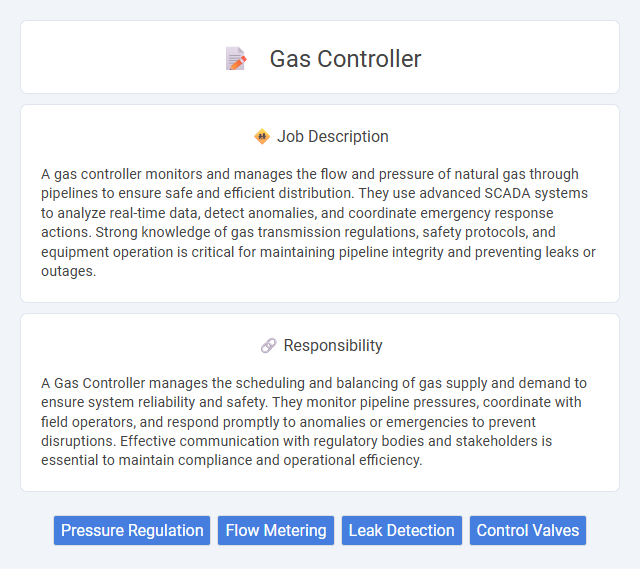
A gas controller monitors and manages the flow and pressure of natural gas through pipelines to ensure safe and efficient distribution. They use advanced SCADA systems to analyze real-time data, detect anomalies, and coordinate emergency response actions. Strong knowledge of gas transmission regulations, safety protocols, and equipment operation is critical for maintaining pipeline integrity and preventing leaks or outages.
Individuals who are detail-oriented and capable of working under pressure are more likely to be suitable for a gas controller position, as the role requires constant monitoring of gas flow and safety systems. Those with strong problem-solving skills and the ability to respond quickly to emergencies tend to perform better in this high-stakes environment. People who struggle with stress or have difficulty maintaining focus may find this job challenging and less fitting for their abilities.
Qualification
A Gas Controller typically requires a strong foundation in engineering, often holding a degree in mechanical, chemical, or petroleum engineering. Certifications such as Gas Distribution Certification or Pipeline Control Operations are highly valued for ensuring compliance with safety standards. Proficiency in SCADA systems, emergency response protocols, and real-time monitoring tools is essential for managing gas flow efficiently and safely.
Responsibility
A Gas Controller manages the scheduling and balancing of gas supply and demand to ensure system reliability and safety. They monitor pipeline pressures, coordinate with field operators, and respond promptly to anomalies or emergencies to prevent disruptions. Effective communication with regulatory bodies and stakeholders is essential to maintain compliance and operational efficiency.
Benefit
Gas controller jobs likely offer benefits such as competitive salaries and comprehensive health insurance plans, contributing to financial stability and well-being. Employees may also receive retirement savings options and paid leave, enhancing long-term security and work-life balance. Opportunities for professional growth and skill development could further increase job satisfaction and career advancement probabilities.
Challenge
A gas controller job likely involves managing complex systems to ensure safe and efficient gas distribution, which can present significant challenges in maintaining system stability under fluctuating demand. Navigating emergency situations and rapidly responding to potential safety hazards may frequently test a controller's decision-making skills. The role probably requires constant vigilance and the ability to interpret real-time data accurately to prevent disruptions and accidents.
Career Advancement
A gas controller plays a critical role in the energy sector by managing the flow and distribution of natural gas to ensure safety and efficiency. Career advancement opportunities often include positions such as senior gas controller, operations supervisor, or energy systems analyst, requiring enhanced technical knowledge and leadership skills. Gaining certifications in pipeline management and energy regulations significantly boosts prospects for higher roles and specialized projects.
Key Terms
Pressure Regulation
A gas controller specializing in pressure regulation ensures the safe and efficient management of gas flow within pipelines by continuously monitoring and adjusting pressure levels to meet operational standards. Utilizing advanced control systems and pressure sensors, the gas controller prevents pressure fluctuations that could lead to leaks or system failures. Expertise in pressure regulation enhances pipeline integrity, safeguards equipment, and maintains compliance with industrial safety regulations.
Flow Metering
A Gas Controller specializing in Flow Metering ensures accurate measurement and regulation of gas flow within pipelines and processing facilities to maintain system efficiency and safety. They analyze real-time data from flow meters, calibrate instruments, and troubleshoot discrepancies to optimize gas distribution and prevent losses. Expertise in SCADA systems and knowledge of pressure, temperature, and volume correction factors are crucial for precise gas flow management.
Leak Detection
Gas controllers specialize in monitoring and managing the flow and pressure of gases within industrial systems, with a critical focus on leak detection to ensure safety and regulatory compliance. Utilizing advanced sensors and real-time data analytics, they quickly identify gas leaks, minimizing the risk of hazardous incidents and operational downtime. Proficiency in interpreting gas detection system readings and coordinating emergency response protocols is essential for maintaining safe environments in gas distribution networks and processing plants.
Control Valves
A gas controller specializing in control valves ensures optimal regulation of gas flow and pressure within pipelines and distribution networks, maintaining safety and efficiency. This role involves calibrating, troubleshooting, and maintaining control valves to respond accurately to system demands and prevent leaks or malfunctions. Expertise in valve types such as globe, ball, and butterfly valves, alongside automation systems, is essential for precise gas flow management and regulatory compliance.
 kuljobs.com
kuljobs.com